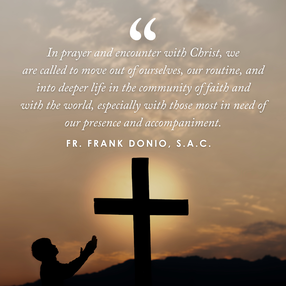 “When we become creatures of habit and grow bored, and the mission becomes a ‘job’, it is time to open our hearts to that second call of Jesus, for he never stops calling us. He calls us to make us set out; he calls us to remake us. Do not be afraid of this second call of Jesus.” - Pope Francis, Homily for Vespers with Bishops, Priests, Deacons, Consecrated Persons, Seminarians, and Pastoral Workers, World Youth Day, Lisbon, Portugal, August 2, 2023 Many people who read our newsletter engage in some type of ministry within the Church, full-time or part-time. Others engage in various types of apostolic work. All are serving the mission of Christ and the Church, each in the way in which they are called. Sometimes, as Pope Francis points out, “mission becomes a ‘job.’” We may need to recognize a “second call of Jesus.” He calls us to himself most profoundly in the Eucharist, whether at Mass or in adoration. In prayer and encounter with Christ, we are called to move out of ourselves, our routine, and into deeper life in the community of faith and with the world, especially with those most in need of our presence and accompaniment. Each of the reflections below given by seven bishops, including the President of the United States Conference of Catholic Bishops, Archbishop Timothy Broglio of the Archdiocese for the Military Services, is not simply for the time of World Youth Day. They are quite relevant to all on mission for Christ as we commit ourselves daily to living for him. We invite you to listen to them as part of your time of prayer or as you journey to others on mission. May the Charity of Christ urge us on! In Christ, Apostle of the Eternal Father, Fr. Frank
0 Comments
In this week’s Gospel, we hear Jesus encouraging us to “Be watchful! Be alert!” in waiting for the coming of the Reign of God. Jesus uses the image of a homeowner who first secures his home and belongings before leaving to take a trip. Because his travels take him far from his property, the homeowner is intentional about ensuring that his own property is in order before setting out for a new road and destination. We might imagine the factors that would drive his painstakingly detailed preparations: extra security to protect his home from thieves, people to check on the resources of the house to make sure that it doesn’t flood or become too drafty without anyone inhabiting it, and perhaps also to achieve a sense of his own inner peace, that he has taken an active role in protecting his property. Jesus’ parable reminds us the importance of securing our own “inner” home and taking an active role in preparing ourselves for our own journeys in life. For me, this parable brings to mind the importance of engaging in our own formation. During my time as an apprentice catechetical leader as part of the University of Notre Dame’s Echo Faith Formation Leadership Program, I was introduced to the hard work of formation. Formation is the intentional cultivation of our spiritual, human, intellectual, and pastoral qualities as human beings that allows us to live out our call to holiness in a generous and healthy way in ministry. In Echo, I entered the world of professional ministry for the first time. I learned quickly that ministry calls us to give deeply of ourselves; however, in being new to ministry, I neglected to secure my own “inner home” of my mind, heart, body, and soul before journeying out of myself to encounter others in the work of evangelization and catechesis. I was susceptible to the outside thieves of comparison, results-driven ministry, and how I could best show off my training and theological knowledge to those I served. In order to make an offering of my own life in ministry that truly served the coming of the reign of God and did not depend on my own efforts or ego, I had to learn to engage my own formation. I intentionally cultivated a life of prayer, took care in applying my studies in catechesis and ministry to my work, and reflected and healed through a relationship with a therapist. Over time, I felt revitalized and more able to cooperate with the Spirit’s work in my life and ministry because I was no longer focused on just trying to survive. Service Suggestion: In the Christian life, we are called to accompany others in the life of faith. A relationship of accompaniment is a perfect setting for formation; it allows us to lean on and learn from each other how best to imitate Jesus in our life. Is there someone in your own life, especially in difficult circumstances, who you might intentionally accompany this Advent? How can you help them secure their own “inner” house on the journey of faith through walking with them in solidarity, mutuality, and listening? Focus: Spirituality By failing at trying to minister based on my own efforts to be the most knowledgeable and most available to those I served, I learned that with the help of the Holy Spirit, I had to engage my own formation so I could be awake, alert, and ready to make of myself a healthy and holy offering. Through formation, I grew to become a minister with her house in order while being on the journey of faith and ministry, prepared to meet Jesus in those I served “whether in the evening, or at midnight, or at cockcrow, or in the morning.” How can you aim to put your own inner house in order this Advent? Are there spaces in your life where you can engage in your own formation in order to make a more generous and healthy offering of your life? Prayer God, Isaiah speaks out “Yet, O Lord, you are our father; we are the clay and you the potter: we are all the work of your hands.” We remember that our lives are the spaces where our salvation unfolds, where we are formed and shaped into art by you, the Artist of Artists. Send your Spirit upon us to be moved by those you place in our path so we may be formed in compassion, empathy, and solidarity. Strengthen us to take an active role in shaping our world to be a reflection of your infinite love through the witness of our lives. Amen.
When I made the shift to working from home almost a month ago, I was excited for a change of pace: sleeping in, a 30-second commute from my bed, working in pajamas all day, not packing a lunch. But when it came down to it, I became restless and had trouble settling down. Focusing on work was difficult. Being productive did not come easy, with my mind wandering for much of the workday. I had embraced the idea of a change of pace, but not the realities of what that change really meant.
Prayer, when I remembered to make time for it, was similarly difficult to settle into. It took me some time to realize what was happening, in part because I work in a secular field. Since I don’t spend my workdays in the Church sphere, I don’t have many explicit or subtle reminders that point my day toward God. Meetings don’t begin with a prayer. My daily tasks and conversations with colleagues don’t revolve around Church activities and ministry. I don’t interact with my pastor or bishop over the course of my day. And though I’ve made an effort over the years to weave prayer and reminders of God into my daily life, my routine has been disrupted. So, naturally, my prayer life has gone out the window. Another piece to mention is that I live alone. Normally, I have a number of social engagements in the evenings and on weekends, often with Catholic friends. Our interactions have a shared Catholic identity baked in and serve as additional reminders of faith. Now that I’ve been largely alone for a month, my days seem to blur together. It's become easy to turn in on my own thoughts and seek out distractions to numb the collective grief we’re all feeling: the loss of normalcy and a sense of security, cancelled plans, and the uncertainty of when we’ll return to some semblance of normal. And in the midst of that, I forgot to pray. It dawned on me that I’ve been given an opportunity and a challenge: I’ve been thrust into an unchosen solitary monastic existence. I have the once-in-a-lifetime chance to completely re-invent what “normal” looks like for me in almost every way. While I owe the company 8 hours of my day, 5 days a week, everything else is mine to do with as I wish. I have a blank canvas. I don’t have to dress for work, shave, or drive to and from the office. I don’t have a spouse or children to care for, no roommate, and no one to interact with here in my home... except God. If I choose to, I can rebuild “normal” with a different foundation and framework, one centered on God. But I don’t have to be a full-time hermit in order to do this well. It’s a lesson that came to me in the midst of prayer and reflection during the Paschal Triduum. Something in me tends to go too hard during Holy Week, especially on Good Friday, and I feel a need to do as much as I can to enter into the sacrifice of Calvary in solitude. Once the quiet of Holy Saturday came around, though, I realized that in the inner urgency to “do” Holy Week so well on my own, I’d forgotten to “be” in the presence of God. Here I was, waiting for Easter with nothing left to do and no one to do it with. All the prayers and meditations had been said, all the fasting was ended, and all I could do was sit and wait. It was a striking reminder that, oftentimes, we need to just be and make room for God to do some work in our lives. Archbishop Wilton Gregory, in his homily on Easter Sunday, noted how important the concept of time is to the story of our salvation, and that Easter “resets the clocks and calendars of our lives.” It's especially true in these days of being forced to reduce the externals. We have an opportunity and a choice here: to either enter into the quiet and craft something meaningful in our lives, or to just make more noise to drown out the vastness of that quiet. We’ve been making a lot of noise lately, often without realizing it. Thank God for the recent reminders of the power of the phrase, “Be still and know that I am God.” May we all take advantage of this opportunity to hit “reset” and allow God to direct us in those quiet moments. When we re-enter the world in a “new normal”, may we use the lessons from this time of isolation to shape what that normal really ought to look like. Jay Schaefer is a Professional Engineer in Baltimore, working to maintain and improve the region's transportation infrastructure. He sings in his parish choir and is involved with the Knights of Columbus. Jay is also a former staff member and current collaborator of the Catholic Apostolate Center. As I write this, there are currently 2,382 people in my home state of New York who have contracted the Coronavirus, with 21 others having lost their lives in the pandemic. With both of those numbers climbing each day, the feelings of anxiety, helplessness, and despair are palpable— not just in New York, but around the world. Here in New York, I am currently a seminarian on pastoral year (a year-long internship at a parish in my diocese). In an exercise of charity and concern, our diocese like many others has cancelled all Masses, public liturgies, devotions, and meetings through Easter in order to keep our most vulnerable parishioners safe. This has of course posed a certain ministerial crisis since many of the avenues (Mass, confession, one-on-one meetings) that we have been taught to send people down when feeling anxious, despondent, and isolated from God are now closed indefinitely. So, what do we do? This situation is calling us to be creative in how we minister to people. Online resources, social media, live-streaming liturgies, and even just phone calls and video chats can and will keep people feeling connected. I think many of us already know this and have been putting effort into these new ministries and forms of evangelization even before the pandemic. It is true though that without sacraments and personal connection, even this media approach could never be enough. While creative ministry right now is important, I would like to focus rather on the flip side of that same question—what do we do? Here, I would like to address my brother seminarians and anyone, priest and lay alike, that is struggling due to a lack of fulfilling ministry. I don’t think this is a selfish pursuit, but an essential one if we are to check our own feelings of anxiety, helplessness, and despair. Last summer I had the great experience of attending the Institute for Priestly Formation (IPF). In these last few days, one of their spiritual approaches came back to me vividly; they called it Relationship-Identity-Mission—and here the order of the words does matter. IPF posited that many people in ministry may operate backwards. Mission is primary; from there flows Identity (I am a seminarian. I am a youth minister); then, the personal Relationship with Christ gets whatever energy is left. If these last few days without “real ministry” have been a struggle for you, as they have been for me, I think we need to ask ourselves not “what do I do?”—because frankly we cannot do much of anything our Mission truly requires—but rather ask “who am I? I work for Jesus, yes, but is my own, personal relationship with Him primary?” In discussing Relationship-Identity-Mission, the question was often asked “where do you live?” If you live in your Mission and your Identity is synonymous with what you do, you are going to have a difficult month (or maybe even longer). But if you live in the Relationship and make that your starting point, even during a time when the Mission is unclear or nonexistent, then you are going to rediscover your Identity as a beloved son or daughter of a faithful God. Amidst fear and uncertainty, God is giving us this time to go deeper into a relationship with Him, so that we can live out our missions more fruitfully when this is all over. So, if you find you are struggling now because you are living Mission-Identity- Relationship, take his time as a Lenten Retreat and don’t feel bad about it! The world needs your prayers now more than ever, and your creative approach to ministry now will then be the fruit of your time alone with Jesus. If you are living Relationship-Identity-Mission, go deeper and speak honestly with Jesus about frustrations with your minimized Mission. In closing, I would like to offer this consoling quote from Henri Nouwen for your reflection: “We are not what we do, we are not what we have, we are not what others think of us. Coming home is claiming the truth. I am the beloved child of a loving creator.” Jesus is calling us to remain in His Love (John 15:9), a request that I imagine was made for times like these. So choose to live in the relationship, take ownership of your identity as the beloved, and watch your ministry take root. Click here to visit our COVID-19 Resource Page
Spiritual accompaniment has been discussed greatly today within the Church and is an important theme of Pope Francis’ papacy. While accompaniment is manifested throughout the Old Testament and in Christ’s ministry, it is important for the Church to consider how best to implement it in modern times. What does accompaniment look like today? How do we best accompany others along their spiritual journey in deepening their relationship with Jesus Christ? The Art of Accompaniment: Theological, Spiritual, and Practical Elements of Building a More Relational Church, a Catholic Apostolate Center resource developed by Colleen Campbell and Thomas Carani, assists in the growth of true accompaniment within the Church today. Below are ten quotes from The Art of Accompaniment that summarize some of the major points of this important resource in order to introduce you to accompaniment and its role for Christians today. 1. “Since the creation of human beings, God has communicated his love through a relationship with humanity…The Old and New Testament reveal the Trinitarian God to be a God who accompanies.” God models accompaniment for humanity in his self-revelation and relationship with his people throughout salvation history. After the Fall, God revealed himself in his various relationships with important figures such as Abraham and Moses in the Old Testament, culminating in the sending of his Son, Jesus Christ, for the salvation of the world. God Himself is the first model of accompaniment. We look to His example in order to understand and implement accompaniment in the Church today. 2. “Spiritual accompaniment is the apostolate of intentional relationship that is oriented toward a definitive direction of growth in holiness and transformation in the Person of Christ.” Colleen and Tom define accompaniment succinctly: spiritual accompaniment does not happen by accident, but is the result of an intentional decision made by two people. The goal of spiritual accompaniment is a deepening in one’s personal relationship with Jesus Christ and in personal holiness that transforms both the mentor and the person being accompanied, as well as those they encounter. 3. “To remain committed to this deliberate choice of discipleship, a mentor is an active participant in their own spiritual formation, deliberately choosing the path of discipleship as their everyday way of life.” A mentor never ceases to pursue holiness, personal development, and spiritual formation. These are life-long endeavors to which the mentor and the person being accompanied dedicate themselves. 4. “Listening is a crucial practice of the mentor because it not only creates space for openness between mentor and the one accompanied, but also makes room for an awareness of the presence and action of God.” An important part of the spiritual life that Pope Francis has emphasized is the art of listening. We must be silent in order to hear the voice of God and the promptings of the Holy Spirit. The ability to listen well is also incredibly important to the art of accompaniment. When a mentor is adept in the art of listening, he or she affirms the dignity of the person being accompanied and humbly leaves room for the voice of God to be heard and acknowledged. 5. “Discernment is a supernatural gift of the Holy Spirit and useful in coming to identify the movements and actions of God in daily life.” Both the mentor and person being accompanied must grow in their ability to discern the work of God and the presence of the Holy Spirit. While there are many resources within the Church that help form a person in their understanding of discernment, it is ultimately a gift of the Holy Spirit. By praying for clarity, understanding, and wisdom, and by approaching the accompanying relationship in a posture of humility, both the mentor and person being accompanied create an environment in which the actions of God are received and acted upon. Ongoing discernment is crucial to spiritual accompaniment. 6. "Mentors are formed by the community as a result of encountering diverse groups of people, listening to different perspectives, seeking guidance from others, and worshipping and seeking Christ amongst the family of the children of God." The spiritual life does not and cannot exist in a vacuum; the same is true with accompaniment. Both the mentor and person being accompanied are formed by their parishes and communities. The beauty of our relational existence is that our communities of faith are comprised of all sorts of people. This diversity within our parishes enriches each member of the Body of Christ and deepens compassion, understanding, and a spirit of inclusion that helps the mentor better accompany another person. 7. "As they share the journey of the Christian life with the one accompanied, the mentor evangelizes the accompanied by fostering an encounter with Christ in their daily life, drawing connections between the Gospel message and their everyday experiences, and encouraging them toward ongoing conversion to Christ through the relationship of accompaniment." An important aspect of accompaniment is that it is a mutual journey towards Christ. Accompaniment does not happen only in Church settings and does not only address topics of faith—it encompasses an entire life. Our faith life also does not occur in a vacuum, but should impact and inform every aspect of our existence. As a result, accompaniment helps both the mentor and the one being accompanied to draw connections between the Gospel and everyday life. 8. "Those accompanied are open to formation and display their willingness to be formed by authentically seeking holiness, collaborating with their mentor, remaining humble in the midst of difficulty, and giving thought and prayer to challenges or new ideas…they must seek faith formation through study, catechetical ministry through parishes or Catholic institutions, and their own personal learning." Humility is a crucial component of an accompanying relationship—especially for the one being accompanied. The person being accompanied acknowledges the need to walk alongside a mentor and to be formed by them in order to grow in holiness and a relationship with Christ. Therefore, the mentor is an authority figure that respectfully and lovingly informs and collaborates with the one being accompanied, as well as with the Holy Spirit. Furthermore, the one accompanied also seeks personal formation in other trusted places. 9. "In the relationship of accompaniment, the marginalized are provided a space in which they can come to deeply know the love of Jesus Christ through friendship, guidance, and authenticity with a mentor." No one is exempt from an accompanying relationship—it is an important part of the spiritual life that all are invited to. A relationship of accompaniment results in the greatest treasure on earth: friendship with and love of Jesus Christ. A mentor is more than an authority figure. He or she is a friend, helper, and guide who affirms a person’s dignity and walks alongside another to build up the Body of Christ. 10. "The inspiration and model for the apostolate of accompaniment is Mary…In Mary, the Church has a model and intercessor for the apostolate of accompaniment." We cannot have a vibrant and lasting life of faith and thriving relationship with Christ without looking to and having a relationship with His Mother, Mary. The Blessed Virgin Mary always leads us closer to her Son. By looking to her and seeking her guidance and intercession, we can be sure that our efforts to accompany and be accompanied will bear much fruit. To learn more about The Art of Accompaniment and order your copy today, please click here. “Seek God and you will find God. Seek God in all things and you will find God in all things. Seek God always and you will find God always.” – St. Vincent Pallotti
Do we live our lives seeking God or realize that God is seeking us? God is indeed seeking us. In fact, we have been found in our Baptism. We enter into the mission of the Son who was sent by the Eternal Father into the world to save us. We are co-responsible for this mission and are in “holy cooperation” with the Most Blessed Trinity. Therefore, we are sent by Christ as his apostles or missionary disciples into the Church and the world to revive faith and rekindle charity. We accompany other seekers in becoming found in Christ and through his Church. Today is the 170th anniversary of the death of St. Vincent Pallotti. It is also his feast day. He believed, taught, and lived the ideals of accompaniment, co-responsibility, and holy cooperation mentioned above. His foundation, the “Union of Catholic Apostolate, a gift of the Holy Spirit, is a communion of the faithful who, united with God and with one another in accordance with the charism of St. Vincent Pallotti, promote the co-responsibility of all the baptized to revive faith and rekindle charity in the Church and in the world, and to bring all to unity in Christ” (General Statutes, 1). This means that lay people, those in consecrated life, and clergy are in collaboration with one another, not only in the Union, but also in the Church and with those of good will in the world. Each person has a role. Each person is responsible. Each person shares in the mission of the Church in spreading the Gospel. Pope Francis recently wrote about this shared mission in his Apostolic Exhortation, Christus Vivit. He was writing about ministry with young people, but these words can be extended to all the baptized. “Youth ministry has to be synodal; it should involve a ‘journeying together’ that values ‘the charisms that the Spirit bestows in accordance with the vocation and role of each of the Church’s members, through a process of co-responsibility... Motivated by this spirit, we can move towards a participatory and co-responsible Church, one capable of appreciating its own rich variety, gratefully accepting the contributions of the lay faithful, including young people and women, consecrated persons, as well as groups, associations and movements. No one should be excluded or exclude themselves’” (Christus Vivit, 206). For co-responsibility to be truly a lived reality there is much more work to be done. St. Vincent Pallotti was visionary and prophetic in his understanding, but the work was unfinished. Let us not wait. Instead, let us "remember that the Christian life is one of action; not of speech and daydreams. Let there be few words and many deeds and let them be done well." Blessed feast day of St. Vincent Pallotti! May the Charity of Christ urge us on! Today we celebrate the 83rd birthday of our Holy Father, Pope Francis. We thank God for the gift of his life and pray for his continued health and leadership in our Church.
Having a birthday near the holidays must be pretty hard to bear as a child, and maybe even sometimes as an adult. Birthdays are meant to be celebrated, and sometimes they can be overshadowed by other holiday celebrations! My sister has a birthday on Christmas Day and she never seemed to be able to celebrate the same ways I could (my birthday is over the summer). I always felt bad and try to still make it special for her - even now that we are adults. Although we know Pope Francis for his humility and selflessness, I’m sure even he has found it hard to celebrate his special day from time to time. We celebrate birthdays as a way to mark our growing one year older, but I’m sure with a birthday so close to Christmas, his focus has often been on Christ. I would imagine, in his ministry, our pope has reflected on the significance of their birthdays being so close and how he can look to the purpose of the season over his own celebrating. Let’s also reflect on this now. How can we make Jesus’ birthday especially meaningful this year? In what ways can we strive to “celebrate” with Christ? What implications does Christmas have on my upcoming year as I continue to grow in my faith? “The reason for the season” is a common phrase we hear at this time of the year— a helpful little rhyme to keep us thinking about Jesus’ birth. The purpose of the Son of God coming to Earth was to save us all from our own sins, yet we so often confuse this time with shopping deals and stressful holiday travel plans. Our Lord doesn’t need any of that. He doesn’t need physical gifts—he needs our hearts. He doesn’t need perfection—he yearns for our humble, raw, and disheveled selves. He doesn’t need displays of lights and blow-up snowmen—he needs us to shine his light in the darkness. In order to celebrate his birth, we must first put aside the distractions and concerns that keep us away from prayer and peace at Christmas. The meaningful celebrating that we should be doing for Christ isn’t wrapped up with bows and shiny paper, but includes finding time to appreciate and pray about our Lord’s coming. The celebration for an ordinary person may be tied to cake, candles, and presents, but as Pope Francis would likely agree, celebrating Christ comes from the heart. One way I’ve found to celebrate Christ’s birthday amidst the hustle and bustle of the season is by listening to joyful, instrumental Advent and Christmas music. Something about it makes me feel so peaceful and filled with the joy of Christ that I almost prefer it to lyrical Christmas music on the radio or Spotify! Another practice I’ve found to be helpful is focusing on the giving aspect of Christmas. I feel better giving rather than getting things. My favorite way to celebrate the birth of Jesus is to share the gift of the Christmas story with my young Pre-Kindergarten students. Having been blessed to work in a Catholic school, I’m able to share the incredible birth story of Jesus Christ and to teach those beautiful little minds about God’s promise of love to the world. When I sit back and realize the gravity of my role as a catechist to these children, I feel humbled by it. My heart soars, it prepares my soul for Christmas, and I’m reminded of this holy birthday from so long ago in Bethlehem. As we look toward a new year, both for Pope Francis and for us Catholics, we are reminded that Christmas is only the beginning of Christ’s work on Earth. His ministry will begin at a wedding as an adult farther down the line, and his death and Resurrection happen even later than that. We know Christ’s birthday was celebrated by angels sharing the Good News. We know there were shepherds who also heard about Jesus’ birth, and finally three wise men who followed the star to where Jesus was born. This new year has so much faith-filled potential to allow us a chance to listen closely to how the Gospel message tells us to love and to share our love with those we meet. We can show God’s love to all by living out each day as apostles who share the Good News. So today, on this 83rd birthday of our pope, keep him in your prayers. Pray for continued faithful leadership in our Church at this tumultuous time in our world. Pray for his health, that he may find strength in Christ and remain well. Feliz cumpleaños, Papa Francisco! For more resources to accompany you this Advent and Christmas, please click here. Our lives are unmistakably touched by the actions and values of our personal heroes. Many of us looked upon our parents as our first heroes, later adding to their exalted ranks the likes of athletic legends, first responders, teachers, coaches, and others whose passion and commitment went above and beyond in order to make a difference. Even today, heroes walk among us in their duties to God, country, and community: many have answered the call to serve in the armed forces, some are called to religious ministry, and others seek to defend and uphold life through witnessing to life and serving on the margins of society. Many live their lives simply, with no fame or fanfare, as they faithfully seek to better their own little corner of the world and love their families, neighbors, and friends. As Catholics, we have no limit to the heroes to whom we can lift our aspirations (and intercessions!); they are the countless saints of the Kingdom of God and Church Triumphant who, even now, urge us to live more fully for Christ. They are incredible examples that bring others into an encounter with the living God through their lives. All are called to be saints. As Mother Angelica always urged her EWTN viewers, “Don’t miss the opportunity!” Mother Angelica is one of my favorite heroes: her wisdom and insight, coupled with her iconic sense of humor, was so easily accessible on TV and the internet. When she looked into the camera, she was looking at me, speaking to me, urging me to be a better Christian. Sainthood is not just the attainment of spiritual perfection; what is heroic is recognizing and repenting of one’s spiritual shortcomings, returning to the merciful embrace of the Lord, and committing to be a better witness to Christ. Mother Angelica would similarly observe, “Faith is what gets you started. Hope is what keeps you going. Love is what brings you to the end.” Never let personal difficulty or worrying that it’s too much for you to handle scare you from addressing your hunger and desire for holiness. The saints came from all walks of life, meaning that each of us can fully answer the universal call to holiness no matter the circumstances. The demands of the spiritual life require a uniquely formed system of accountability, determination, and humility. While God is forever patient with us, we may become frustrated at ourselves or compare ourselves to our peers. That is why we can turn to the saints as guides and intercessors; they can shape our unique circumstances in life to better identify ways of living out our Christian witness in the world. With all the turmoil of the world, how critical it is for us to live boldly and authentically as Christians! And if we are viewed and treated suspiciously by observers, may we patiently embrace all that for the glory of God! How heroic are the martyrs of Holy Mother Church who “rejoiced that they were considered worthy to suffer dishonor for the sake of the Name [of Christ].” Especially when the negativity of the news tempts many to lose hope in the apparent darkness of the times, how necessary, then, it is for us to bring the brilliant Light of Christ and His Gospel message to expel the darkness and bring peace to those awaiting salvation. May the saints of heaven always remain sources of heroic inspiration throughout our lives, and may we be found worthy to one day join them in the eternal feast of the Kingdom of God! On August 15th, the Solemnity of the Assumption of our Blessed Virgin Mother into heaven, we celebrate Mary’s completion of life on Earth and her existence in eternity with Jesus. We can reflect on her sinless life as she was chosen by God to be the mother of Christ and also on her example of motherhood, grace, and virtue.
On this Marian feast, I feel a special closeness to the Blessed Mother because I recently found out that, I too, am preparing to be a mother. I ask for Mary’s intercession for a healthy pregnancy often and I hope to love more each day like she did. From her moment of saying, “Yes!” to God at a young age, to her worried searching for Jesus in the Temple, and even to her urging of her son at the Wedding at Cana to begin his ministry, Mary is a mother we can relate to. Her faith in God kept her focus on Jesus and his growth, safety, and well-being on Earth in order to ensure that he would fulfill his life’s mission to save us all from sin. Mary is the mother we can all imitate. Mary’s life was probably not an easy one. She faced speculation and ridicule from those in her community when she gave her Fiat and said yes to God’s plan. She lived at a time when a pregnant and unwed woman could be outcast from everyone she knew, but she persisted and trusted. Enduring these hardships could create doubt in someone’s mind and dissuade a person, but Mary stayed true to her grace-filled faith. I like to imagine that her cousin Elizabeth was a kindred spirit for Mary, someone who could support her and was also full of grace and faith. Joseph too, said “Yes!” to God, took Mary as his wife, and raised Jesus with strength and grace. He was a supporter for Mary and loved her, fully knowing his purpose as a protector and provider for the family. Throughout her life, we know that Mary reflected and pondered on the many blessings she had received. Scripture tells us she held them in her heart. Let us appreciate those special moments in our lives, too! Recently, I’ve been trying to take a moment each day to “hold things in my heart” and reflect on the goodness of God. Sometimes it’s when I see the sunshine for the first time that day. Other times it’s at the end of the day in a more reflective manner, and still other times it is in a crucial or stressful moment as I search for the good in what’s going on around me. There are many times throughout our days in which we could pause, reflect on a blessing, and have a grateful moment of prayer. On this Assumption, I challenge you to imitate Mary and learn from her grateful heart in this way. Below is a prayer from the Liturgy of the Hours, a method of prayer that seminarians, priests, religious sisters, deacons, and lay people participate in all over the world. This particular prayer is prayed on the feast of the Assumption. As we celebrate the Assumption of Mary, let us look to her example of faith and devotion and let us ask her to continue to bring us closer to Christ and help us to live for his glory. Almighty God, You gave a humble Virgin the privilege of being mother of your Son, and crowned her with the glory of heaven. May the prayers of the Virgin Mary bring us to the salvation of Christ and raise us up to eternal life. We ask this through our Lord Jesus Christ your Son who lives and reigns with you and the Holy Spirit, one God, forever and ever. Amen. Recently at Mass, our priest explained the love of God as Father in a way that I had never heard before. As a parent and teacher, I resonated with his words deeply. In the Gospel, Jesus sent out 72 disciples in pairs to share the good news (Luke 10:1-12, 17-20). They came back rejoicing in all that they could do - like cast out demons - because of the name of Jesus. But our priest reminded us that this is because of God’s glory, not ours. In fact, Jesus didn’t even need the 72 if he didn’t want them. As God, he could share the Gospel on his own to the whole world, in an instant. But instead, he finds it more beautiful and meaningful to have them and us share in ministry. Yes, it is also messy, but love shared is so much more fruitful. Our priest gave many examples of how a parent lets their child help with chores. I experienced the same “I want to help!” one day as I was cutting strawberries. I could have done it in five minutes by myself, or I could let my two-year-old son help—knowing that this would take much longer, that there would be more to clean up, and that I would have to take a lot more precautions. But I sat him on the counter, and he started taking off stems as I washed the strawberries. He took a turn washing some, too. He let me cut the strawberries, but he said he would put them in the container for me. And what a delight it was to remind him how helpful he was, to have him remind me that “we have to be safe” while using a knife, to see him eat a few strawberries along the way and remark on how yummy they were, and to see the joy on his face when he put the lid on our bowl of cut up strawberries and help put them in the fridge. In the same way, God lets us help him prepare strawberries, too. He delights in our imperfect attempts to help and love, to share in his ministry, wherever it is that he has called us to serve. As I write this, it is the second anniversary of my son’s baptism. It is not lost on me what a gift and responsibility it is to raise our children in the faith: to be nurturing saints for heaven alongside my husband and how grateful I am to our community near and far who support us along the way. But again, I am reminded that God could raise our children much better than us (just ask me about tooth brushing or navigating toddler discipline). But he lets us do so and he gives us love and mercy and grace to accompany us day after day. This grace is found abundantly in the sacraments. I pray that we teach and model to our children that we can always call upon that grace, and that they have a desire to participate in it. I pray that they may say to God, “I want to help!,” knowing that all is for God’s glory—not theirs – and that through Him all things are possible. At the end of the Gospel, Jesus reminds the 72 to “rejoice because your names are written in heaven” (Luke 10:20). My prayer for my children – and for each of us as we celebrate the gift of our baptisms, is that we always know that we are loved, wanted, and called. May we know that by the gift of baptism, our names, too, can be written in heaven. To my son, I pray that you’ll always want to help prepare strawberries with me and with God. Thank you for teaching me about childlike faith in a whole new light. Thank you for letting me help God – even though imperfectly – by raising and loving you. It is mine and your father’s greatest joy to serve God through the gift of our children’s lives. "Rather than seeing summer as the “down time” at a church, commit to approach the coming months with the intention of fostering experiences of active service, quiet prayer and contemplation, and stimulating intellectual work or professional training."
Having worked at a handful of churches, I have observed that the summer is the slowest time of year for parish life. Parishioner’s schedules are all over the place, especially if there are children or teenagers involved, with vacations, camps, etc. During the summer, parish programs tend to slow down (However, some parishes will run a Vacation Bible School, or similar camp-like program). But summer doesn’t have to be a long spiritual nap. In fact, the summer can be a very important time and opportunity for a church, especially for church staff. How you approach the summer can greatly shape the year ahead. Besides the celebration of the Mass, the summer provides a number of unique opportunities for spiritual growth in areas that aren’t always possible throughout the rest of the year. Here are a few opportunities for spiritual growth you might consider for your parish. Parish Mission Trips Many parishes host mission trips—whether local, national, or international. Consider prioritizing mission trips and extending the opportunities to different ages and areas. Some of my best summer memories are the trips I went on to rural Appalachia in high school. These trips instilled in me a call and love for ongoing service in my faith. Plan opportunities not only for parish staff, but also for families to serve together. Make it memorable and accessible. Let missions be an opportunity to get beyond the model of Christian ministry as something that only happens at your church. And remember to report back on the trip through photos, stories, or results to your parish. People love hearing about the activity in their parish community. It creates a sense of energy and momentum that can get carried into fall activities, especially in a youth ministry context. A service trip provides something concrete participants can point to and share with friends, family, or parishioners. I’ve also found that the more “on the fence” parishioners that are hesitant to get involved often take that first step after seeing the fruit of service. Most importantly, participants inevitably leave with a transformed, deeper experience of their faith and a lived experience of Jesus in his ministry to the broken places in need of healing. To find some long-term and short-term mission and service opportunities, click here. Retreats Work at the church never stops, but it does slow down. When is the last time your staff or ministry team spent time away, even just for a day or afternoon, from the office environment together and prayed? There are gorgeous retreat centers and shrines in every state that too often only get visited in the dead of winter. The Christian writer and philosopher Dallas Willard once said, “The greatest threat to devotion to Christ is service for Christ.” He was talking about our tendency to view prayer and contemplation as less fruitful compared to active ministry. Prayer is essential not only to any parish ministry, but to the Christian life overall. Invite your team to pray regularly or be renewed by attending a retreat. Priests are also required by Canon Law to take a retreat. Make sure your parish priest is getting the time off he needs to pray and reflect. If you or your staff is on retreat, pray for your parish priest throughout that time. Staff Development With all the conferences, classes, symposiums, etc., that happen on college campuses or churches throughout the country, summer is a great time to invest in the development of staff and volunteers. Look for opportunities to enhance your team’s intellectual and professional skills. Be flexible and open to new ideas where you and your staff can connect with other professionals or get inspired. If your parish has room in the budget, propose a conference you are passionate about or that will help your work. If you’re a liturgy or music director, take your ministers or musicians out to see a concert of sacred music or take a tour of a cathedral or museum. Rather than seeing summer as the “down time” at a church, commit to approach the coming months with the intention of fostering experiences of active service, quiet prayer and contemplation, and stimulating intellectual work or professional training. You might notice that rather than mustering the energy to get “back in gear” as summer draws to an end, you will feel renewed, enriched, and equipped for the “busy time” ahead. Moreover, you may draw closer to other others working at the parish and be more integrated as a staff, youth group, or ministry team. This can be a leaven to your ministry and parish for the rest of the year. Finally, make sure you have some fun while you’re at it; it is summer after all. *This post was originally published on the Ad Infinitum Blog on June 2, 2016. “Come away by yourselves to a deserted place and rest a while.” (Mark 6:31)
The Apostles had been sent out by Jesus and reported back all that they had done (Mark 6:30). He knew that they needed to care for themselves, so they set out in the boat to go and rest. But, what did they find when they arrived? Over 5,000 people waiting to be fed both spiritually and physically. Despite their probable fatigue, they continued to minister to the needs of the crowd. Their rest was not long, but they did have time together in the boat away from the crowds. They also rested in the Lord as he spoke to them and the crowds. Self-care, therefore, does not mean long periods of time, but that which is needed to move us into fuller service for Christ. When moments of self-care such as prayer, study and spiritual reading, appropriate times of rest and relaxation, or time with friends and family are neglected, living as an apostle who accompanies others into deeper life in Christ can become challenging. Self-care is not self-focus; it is not self-serving. Very often caregivers, especially of the elderly or infirmed, become ill themselves because they have not set apart time for self-care. It is understandable. They want to give fully to their loved ones. Those in ministry or the apostolate want to do the same for the beloved of Christ. In both instances, though, great damage can come to the caregiver—leaving them unable to care. Self-care is meant to assist in becoming more other-focused, more self-giving. In many ways, the great founder of Western monasticism, St. Benedict, whose feast day is today, understood well what is at the heart of Christian self-care – ora et labora – prayer and work in the context of a stable community life. When either are neglected, then one is not able to give fully for the Lord. Life in community, whether in a religious community such as a monastery, or in the community of faith, gives one a stable place to be accompanied, to grow in the spiritual life, and to rest with Christ, especially in the Eucharist. Relationships can be built in trust and burdens can be shared. Peace that comes from the Prince of Peace can then be found. It is this peace, love, and mercy that we share with others as his apostles. In the last months, a former student of mine discerned that he is called to live as a Benedictine, another discerned that he is called to the Dominicans, another as a diocesan priest, and two others that they are called to marriage. Prior to these decisions, there was much prayer, but also a bit of a lack of inner peace. Accompanied by many, these young adults came to peace in their decisions as their way to follow Christ as his apostles. Please pray for them. Pray also for those, especially in ministry and apostolate, who are not properly caring for themselves. May we accompany them to care for themselves so that they may better care for the People of God. May the Charity of Christ urge us on! For more resources on Self-Care in Ministry, please click here. “Think big, start small.” That was the one-phrase summary that my working group at the Post-Synodal Forum on Young People presented on our last full day at the Il Carmelo retreat house. For three and a half days, over 250 youth and young adults from over 110 countries and over 30 Catholic groups and movements gathered in Rome to discuss the Synod on Young People, the Faith, and Vocational Discernment and Pope Francis’ Apostolic Exhortation Christus Vivit. My group was comprised of fourteen delegates who represented nations including India, Germany, Zambia, Slovenia, Moldova, and more. We came up with these four words (Think big, start small) because over the course of the many panels, presentations, interventions, and working group meetings, we realized just how big of an endeavor engaging the young people of our global Church is. Country to country, diocese to diocese, some general patterns remained the same. Christus Vivit and the synod present a beacon of hope; unfortunately, in many countries the document has not been widely read, although it has been generally well liked when it has been read. In many places, the document is not translated into the necessary languages. My friend Stephen from Hong Kong, for example, mentioned that young people simply cannot afford a printed copy of the document in his country. Many young people mentioned how they face opposition from clergy and lay people regarding their active role in the Church. One of the delegates from Ireland recalled an instance when a new dishwasher was touted as more important for her parish than funds to go to youth ministry when they were needed. The challenges that face us are great and they are global, but young people, and the members of the clergy and laity that support them and collaborate with them, will not be stopped. In chapter four of Christus Vivit, Pope Francis reminds young people that they are loved by God, that Christ saves us, and that Christ is alive! These words have settled deep into the hearts of young people and the people who advocate for and accompany them. Many times, Pope Francis has reminded young people that they are protagonists in the Church, that young people are not just the future of the Church, but also the now of the Church. These realities came up over and over again in our discussions at the forum. I was amazed by the initiatives in Ghana for ministry to young people that included a separate and distinct ministry to young people who are imprisoned. I was happily surprised to hear that many nations had national youth organizations that are led by young people. For example, my friend from India, Jesvita, is the most recent president of an Indian Catholic Student movement. Importantly, these initiatives are not ones that exist within a “young people bubble,” but are movements and ministries of collaboration that see the young people, the clergy, and their ‘elders’—as Pope Francis calls them in Christus Vivit—working together, being synodal. The biggest takeaways from this forum are encouraging to say the least. Young people understand the need to be people of action, or apostles on mission. Only then can we truly be leaders. These actions must be concrete, not vague generalizations, and they must be collaborative. Young people want to integrate what the Holy Father has written for us in Christus Vivit into how we approach our ministry to young people. The principle of accompaniment was one that was constantly highlighted at the forum, proof that young people want to be a generation of encounter. The first line of our ten-line summary that was presented to the Dicastery and the Holy Father read, “we are the face of Christ, fully alive.” And this is how we move forward, with an understanding of the reality that we are the face of Christ in our world, that we are protagonists. Acting with Christ as our guide, we seek the conversion of hearts, both ours and those of others, and we have dreams that are big. May we never be deterred, may we always think big and start small, and may we always seek to build the Kingdom of God by walking together, listening to one another, and persevering in our shared faith. For more resources on the Synod on Young People, Faith, and Vocational Discernment, please click here. The beginning of summer is an exciting time. The school year may be done, and more leisurely activities may be planned, but for the ministry of a local church, the work never stops. The sacraments must be administered, the Holy Mass must be celebrated, the sick and dying must be cared for, and those with life’s burdens and clouds of uncertainty must be consoled: the sacred works of ministry never cease. As even our Lord observed, “The harvest is abundant but the laborers are few; so ask the master of the harvest to send out laborers for his harvest.” God calls upon certain men to embrace a unique vocation of humble sanctity, service, and obedience as priests. As such, seeing the result of years—even decades—of discernment and spiritual formation come to fruition is a cause of immense jubilation for a local church. Ordination day, then, gathers the diocese to happily witness the sacred rite through which the bishop consecrates these men into priestly service. And how wonderful such an occasion is— especially for those who have walked with these men—as new spiritual life is breathed into the church.
While recent scandals might cause some to worry or be wary, the celebration of priestly ordination serves as a reminder that God remains with us and never ceases in caring for the needs of his Church. The sinful actions of a few do not negate the sanctity and solemnity of a call to holy priesthood; the standard remains high even though some have acted beneath it. The saying “God is good, all the time; all the time, God is good” serves as a simple but handy reminder of His faithfulness, which is manifested in the ongoing call for certain men to care for the immense needs of His people. As Cardinal Timothy Dolan of New York observed: Is that not good news? Aren’t you tired of hearing about priests who are trouble? Aren’t you fatigued about hearing of priests in scandals? Aren’t you kind of weary [hearing] about priests that have been removed? Don’t you get a little discouraged when you hear about the vocation crisis? Now, all of those are realities; we don’t need to run from them, but I don’t know about you, but I see six new priests who are enthusiastic and eager and raring to go. That gives me a lot of hope and a lot of encouragement. And it’s going to be a high honor for me to ordain them. Discerning how to answer God’s calling to a vocation in your life is an ongoing process, but this does not mean you need to wrestle with it alone. The Church has a wealth of resources to aid in beginning to answer the questions regarding vocational discernment. Spiritual direction is a common method—whether in person or through a treasure trove of books and reflections which have been produced through the centuries and for a Church which has faced a whole spectrum of challenges and threats. God remains with us through it all! Other means of discernment include retreats and talks offered by dioceses and religious communities. And this is also true for those who may be discerning marriage as a vocation. In Holy Scripture, priesthood can be traced back to the Levite tribe of the Israelites, but the family unit is often modeled after the Holy Family, the highest ideal. No matter what your calling in life, God has sanctified it and calls us all to best apply our lives to the service of others through our vocation. Just as the United States has recently commemorated Memorial Day and the countless who have died answering the call to fight for and defend our rights and freedoms, we as a church can come together to appreciate and love our priests, who live to serve the Body of Christ. They have heard and answered the call of the Most High God and trusted in Him to illuminate the path they have been destined to follow in service. They walk with us in faith to celebrate the sacramental life of the Church and comfort those who seek consolation and peace. In supporting our priests and religious—who can be found in parishes, hospitals, cemeteries, battlefields, and schools—we can celebrate with them as their numbers increase during ordinations so as to aid in the beautiful works of holy ministry. For more resources on Vocational Discernment, please click here. . A little more than three years ago, I was asked to be the coordinator of my parish’s youth group. I had just begun college and taking on such a big responsibility seemed terrifying - it felt like I was trying to climb a very tall mountain and the top seemed impossible to reach. As I started this new position, I noticed that my group lacked organization, teen attendance, and the presence of trust because they did not know me as their leader. Working to create a semblance of routine and structure to use every Friday afternoon was probably the easiest thing to do, but attendance and building trust would need more work. We had about 4 teens that were committed to attending youth group every Friday. I asked myself, “How am I going to get more teens to attend? Where do I find them?” Another important question I asked was, “What will make them want to come back next Friday?” So, I got to work and created social media accounts under the group’s name to get the word out about our meetings. I spoke to the prayer group for adults that would meet at the same time and asked them to bring their teens to our group instead of leaving them at home. With a lot of prayer and thought, I realized that what these teens were lacking was an encounter with Jesus, so I would focus my talks on God the Father, Jesus, and the Holy Spirit. I also focused on doing group prayers where the teens had the opportunity to speak to God. As stated in Living as Missionary Disciples, “An encounter with the Lord brings about a profound transformation in all who do not close themselves off from him” (LMD 11). I witnessed this firsthand. Many teens started to come and seemed hungry to know more about God. Then came the third task: building trust. I noticed that these teens desperately needed someone to trust and wanted to be heard. Many times, we think that a young person has the perfect life. Most of these teens’ parents provide everything for them, including shelter, food, and clothing. It’s easy to think that all they do is go to school during the day and help around the house with a few chores. In reality, this isn’t true. I’ve come to learn that many of these teens experience peer pressure at school, have problems at home, and are constantly being bombarded with impossible standards on social media. The teens needed someone to walk next to them and listen to them. As Living as Missionary Disciples states, “The response to this encounter with Christ needs accompaniment” (LMD 14). The teens needed someone that would not judge them but instead be there for them. They needed to be able to be themselves and feel accepted the way they are despite their past or where they are now. As Living as Missionary Disciples also says, “We are not called to make judgements about others.” (LMD 15) Three years later, I have finished this pastoral ministry journey. I learned so much from the teens, such as the importance of having a personal encounter with God and the importance of accompanying the members of your ministry. Some tips I have for a pastoral minister include valuing the importance of constant prayer and regularly asking the Holy Spirit to come upon the ministry and give a vision of where to go and where to take the ministry. It’s also important to be able to recognize the needs of your community or within the demographic with which you are working and to be able to address those needs. There should also be a balance of “church work” and a healthy personal life. I personally lacked this balance and burned out, which led me to give so much and not take the time to give back to myself. Taking these measures will prevent the minister from burning out and help him or her be able to give more in the long run. For more tips on self-care visit our Self-Care for Healthy Ministry resource page. |
Details
Archives
July 2024
Categories
All
|
About |
Media |
© COPYRIGHT 2024 | ALL RIGHTS RESERVED

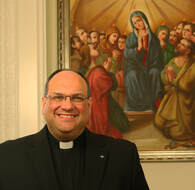
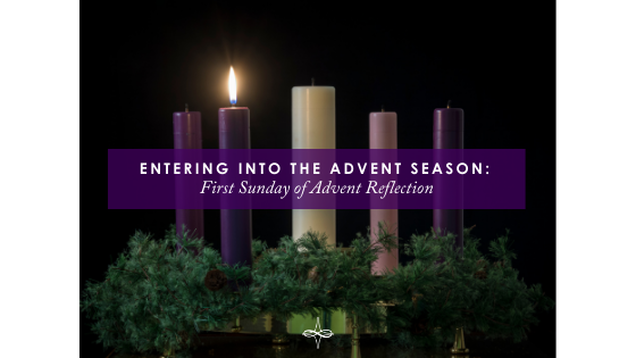


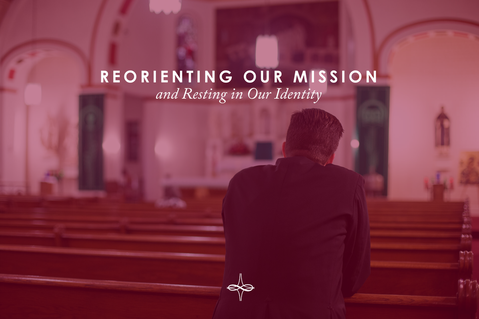
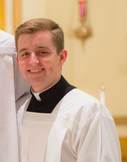


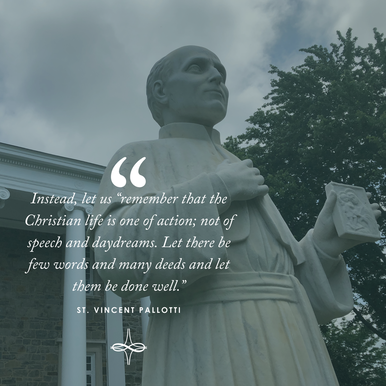
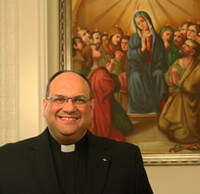
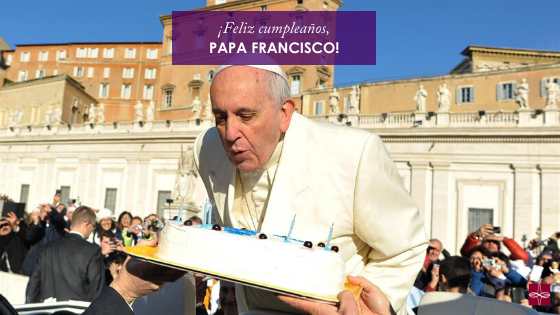

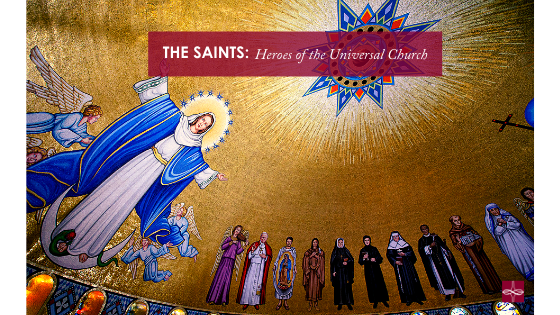

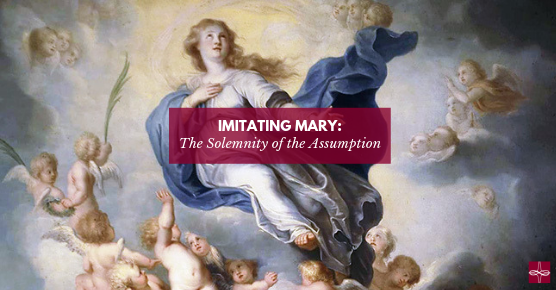






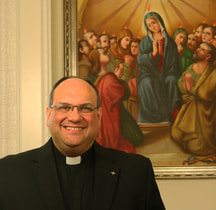
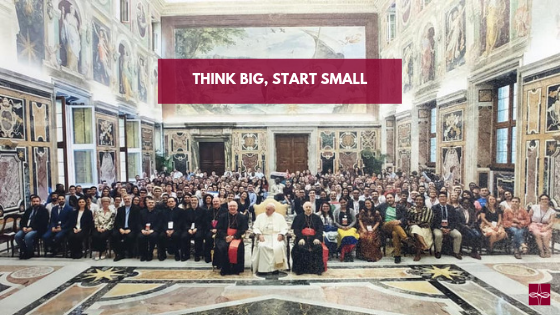

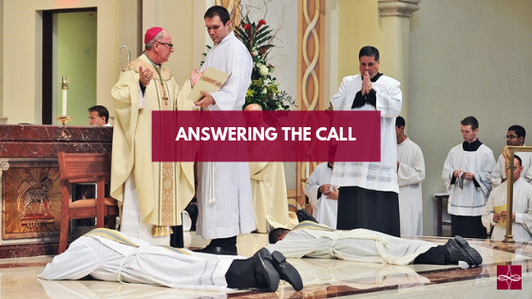


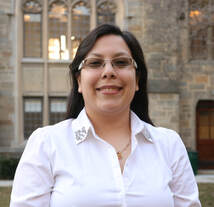
 RSS Feed
RSS Feed